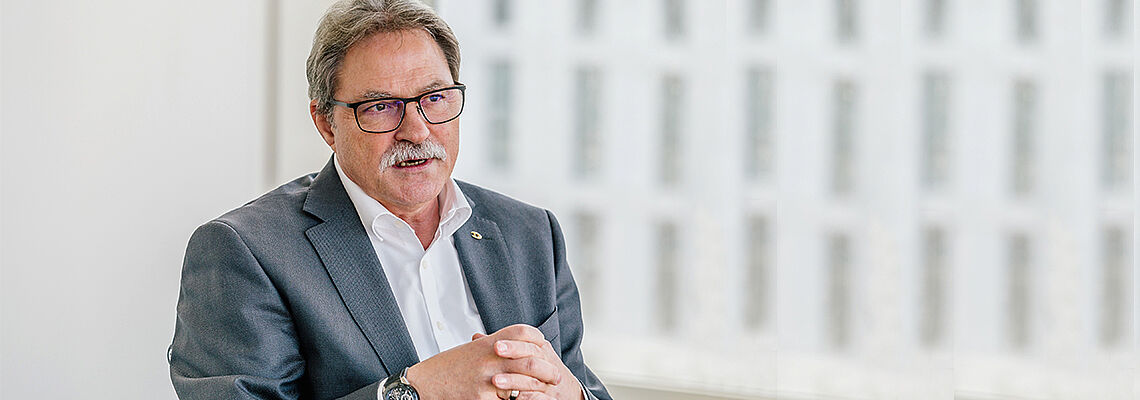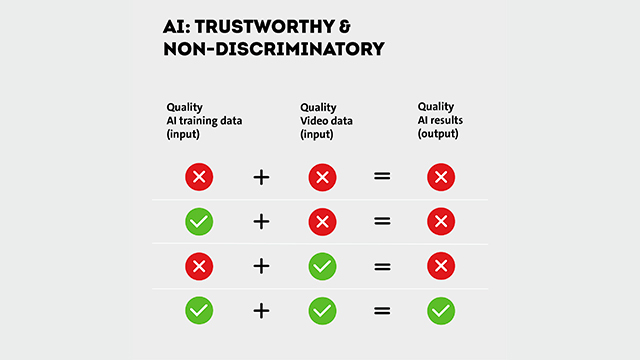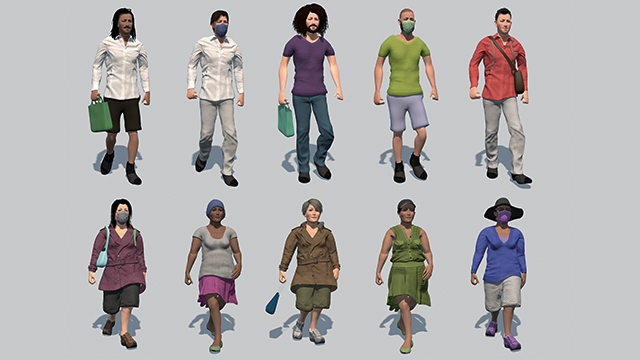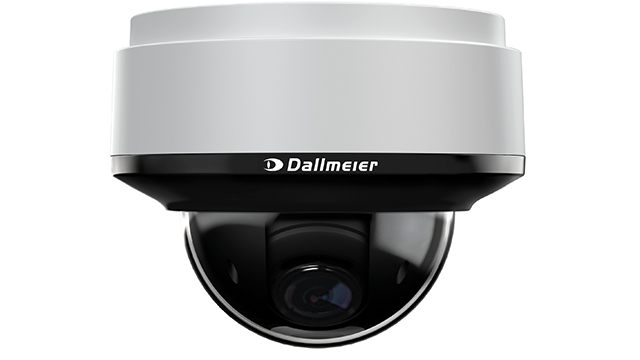Newsletter
Exclusive expert tips, customer stories and more.

Mr Dallmeier, the past months have clearly shown that Corona is not over yet. How have you and your company dealt with this crisis so far? What economic impact has this pandemic had on your company – and how do you see the future in this regard?
Due to the weakness in the airports, casinos and stadiums sectors, which are important for us, there have been painful losses in turnover in our company. However, these have not fundamentally affected us. In the second half of 2021, we could see a clear revival of business in these areas. In addition – and particularly pleasing – we can observe that other business areas such as Safe City or Industry developed beyond our expectations. We are very optimistic about 2022 and expect above-average growth as soon as customers in our target markets clear their investment backlogs.
Before we get to specific projects for 2022: A number of overarching issues are intensively occupying not only the security industry in these times. At Dallmeier, you also perceive a threefold, partly overlapping complex of issues – under the keywords data protection, ethics and sustainability. To begin with data protection: The GDPR is of central importance here...
...right. The requirements of the GDPR as a guideline with the principles of “Privacy & Security by Design“ are well known, as is the potential vulnerability of video systems as IoT systems. In more and more customer discussions, the first question is therefore about data protection and data security – and above all about the documentation of capabilities. A perennial issue that, in our view, continues to gain in importance.
The second major issue for our industry is increasingly “ethical responsibility“: in October 2020, for example, the EU Parliament installed cameras from a Chinese manufacturer whose systems are also used in the context of the Uyghur internment in Xinjiang. Due to public pressure and with the approval of almost 90% of MEPs, these were removed again in April 2021. This is just one example to illustrate the issue for your readers: Public pressure to act ethically is growing. Increasingly, governments – the US for some time now, most recently the UK – are also regulating which systems public sector clients are allowed to use. I expect – and wish – that this will also happen for the rest of Europe. I also expect that the private sector will become more sensitive to whether its procurement decisions support human rights violations elsewhere. Here, an investment in the “wrong“ products can quickly turn out to be an economic dead end or a negative boomerang in terms of publicity – quite apart from one’s own ethical responsibility.

The GDPR is a typically European project: it is about guaranteeing the free movement of data within the internal market - and in a form that necessarily takes into account the protection of the individual whose data is being processed. What significance does this fundamental rights-sensitive foundation have for a German and European brand? Is it a strong argument on the world market? Could more be done for it?
Our Western understanding of privacy, political independence and human rights has emerged historically under much suffering. Data protection and data security are in our cultural DNA, so to speak. If you can then document that the entire value chain is in Germany or Europe, that you as a manufacturer commission neutral, external service providers with intensive penetration tests for your products, that you develop and manufacture in a constitutional system where perhaps no government would think of demanding the programming of “backdoors“, then that is very important for many decision-makers.
I think manufacturers and customers as well as “the politicians“ and the supervisory authorities for data protection and cybersecurity should take on more responsibility here together in the future, not least for our own markets. We should use the GDPR and our cultural DNA to develop products that are absolutely leading in terms of data protection. Then supposed bureaucratic hurdles suddenly create the potential for distinguishing features that, for cultural reasons alone, cannot be copied so easily in a collectivist social framework.
This also includes not reflexively always choosing the – by the way, often only supposedly – most favourable solution, but also the one that expresses the greatest ethical responsibility. If we internalise this, everyone will benefit in the long run: manufacturers, customers and our free democratic basic order.
Data protection and data security are in our cultural DNA.
Dieter Dallmeier, CEO & Founder, Dallmeier electronic
Data protection merges into the topic of “trustworthy AI“ – a meta-topic that is also on the agenda of the European Union: According to this, a system working with artificial intelligence should not only be absolutely harmless in normative terms. It should also meet ethical principles – and must not only cause no technical damage, but also no social damage, e.g. through non-transparent decision-making processes or discriminatory AI results. How does a manufacturer of video security technology meet these very high demands?
The combination of video technology and AI offers important efficiency and productivity gains that can strengthen the competitiveness of European industry and improve the well-being of citizens. They can also help find solutions to some of society’s most pressing challenges. These include combating climate change and environmental degradation, sustainability and demographic change challenges, protecting our democracies and, where necessary and proportionate, fighting crime – e.g. through a Safe and Smart City Strategy.
As manufacturers, however, we have a duty to ensure that our products and solutions, but also we as a company as a whole, are “trustworthy“. Whether it is data protection and data security, cloud services, sustainability and environmental protection, corporate ethics or the topic of AI. So I see the topic of “trust“ as a holistic one, in security technology even more than in other areas. And this is especially true for the use of artificial intelligence: only if politics, in cooperation with industry, develops the right answers and a corresponding moral compass, can we expect the necessary acceptance among the population in the medium and long term. And this is also a great opportunity for us as European technology manufacturers.

Let's take a closer look at concrete examples of what trustworthy AI can mean in the context of video technology. For example, there are the issues of classifying objects with the help of learned images or facial recognition...?
AI is always particularly problematic when it comes to personal or personal-relatable data. The topic of facial recognition is a good example: with many systems there is an ethical bias due to skin colour. As long as this problem is not solved satisfactorily, you will rightly have a trust and acceptance problem. There is also always the question of exactly how the algorithms work. Processing the data in an algorithmic “black box“, where it is not transparently comprehensible how the data is correlated, is not without problems. Especially if self-learning aspects are added at some point. Another issue, apart from the quality of the real data or video data, is which data is used to “train“ the systems. In many applications, we now work exclusively with synthetic data in order to solve the major issue of “data protection-relevant personal references in training data“.

This training is done by your own 3D team, which also virtualises customer environments for planning purposes?
Yes, that is correct. A good example is teaching our systems to search for features – such as the colour of outerwear. Here, our 3D team creates a whole armada of artificial 3D figures from which our systems then recognise the corresponding patterns. We also work in a similar way in our casino solutions when analysing chip stacks.
The third major topic besides data protection and trustworthy AI is the debate about sustainability and how to realise it, which also encompasses all areas of economic life. Could you explain what your strategy is here at Dallmeier and what contribution you can make here?
The topic of sustainability and resource conservation has been lived at Dallmeier from the very beginning. As a manufacturer of security systems, we can of course only make a comparatively small contribution here. But we see that quality is important for more and more customers, which translates directly into durability and low maintenance. This is not only about costs. Many of our customers want to make their contribution to the conservation of our natural resources under the aspect of “corporate responsibility“. We should also mention our own sustainability management system, consisting of quality, environmental, occupational health and safety and energy management.
Mr Dallmeier, let’s move on to innovations at the product level in this new year. What can we expect here?
Specifically, we will be launching a new camera solution in the single sensor / dome sector: The Domera® camera series will eliminate some major “headaches“ of classic solutions. On the one hand, it significantly reduces and simplifies the installation and adjustment effort for the installer. Much of the work that is currently done manually “on the ladder“ can in future be done conveniently from the computer. We can also look forward to an unprecedented white light and IR illumination concept. In addition, the dome housing eliminates many of the disadvantages of the classic box or bullet form factors in almost all areas of application – starting with the notorious “spider problem“, where the camera field of view is often covered by spider webs, to the much more difficult adjustment of the camera. New analysis functions and apps round off the function and feature portfolio of the new Domera® camera series.
And on the subject of system openness, I am pleased to announce to our end customers and installers that our patented Panomera® multifocal sensor systems are now also fully integrated into the video management systems of Milestone and Genetec. This provides our joint customers with an extremely powerful “best of breed“ combination of leading software systems and the best long range and large area camera system available on the market.

And on the subject of system openness, I am pleased to announce to our end customers and installers that our patented Panomera® multifocal sensor systems are now also fully integrated into the video management systems of Milestone and Genetec. This provides our joint customers with an extremely powerful “best of breed“ combination of leading software systems and the best long range and large area camera system available on the market.
Do you have any questions? Or would you like to share your thoughts on this subject with us?
We welcome you to post your comments and remarks!